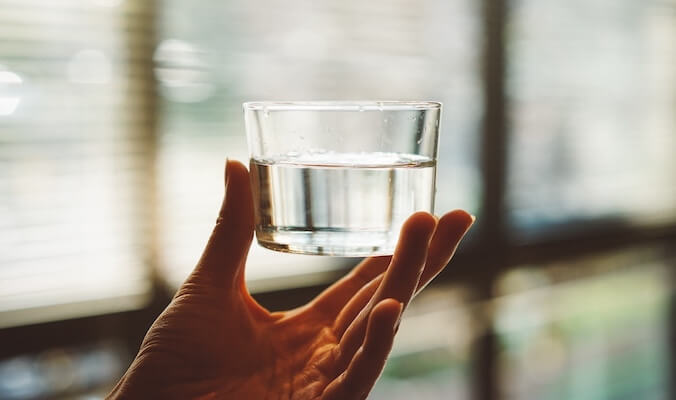The Power of Hydration for Physical and Mental Well-Being

© Manki Kim
Let’s talk about the famous eight glasses of water per day. The truth is, six is okay, as is ten, and you can substitute around half for fresh fruit juices, tea, even soup! When it comes to hydration, all clear liquids count. That said, water should still be your first choice.
Effects on the body
Every fitness and wellness guide out there lists desirable benefits like detox, more energy, etc. but they’ll often skip the part about how you get them. Let’s take a look at the backend of the story.
Better digestion
Hydration is an essential part of healthy and balanced eating habits because it helps your body absorb the nutrients more efficiently, and you have an easier time expelling the leftover waste (pardon the picture but we all know it’s a natural thing that needs to happen). Dehydration can cause constipation, bloating, painful gas pockets in the bowels, etc.
If it goes on for too long you risk intestines blockage, hemorrhoids, or even prolapses. So, it might be awkward to think about a “number 2 schedule” but you really do need to drink enough water to make it happen regularly and with minimal strain.
Safer movement
Your joints are cushioned by cartilage, which prevents the bones from rubbing and damaging each other. Cartilage tissue is around 80% water. If you don’t hydrate well, it dries up, so you get joint stiffness, pain, and difficulty moving.
Likewise, water directly contributes to the volume of blood in your body. Blood transports nutrients and oxygen to your cells. Dehydration means bad delivery service, which means fatigue, soreness, and “brain fog”. Everyday tasks become difficult, and you’re more at risk of injury if you exercise.
Nerves & organs maintenance
When you don’t drink enough water, your blood thickens, so your heart has to pump extra hard. The bonus strain puts you at risk of arrhythmia and even heart attacks. The concentration of electrolytes (minerals) in your blood also gets thrown off. Electrolyte imbalances have negative effects on your bones, muscles, nerves, heart, blood vessels, and kidneys.
Kidneys are especially important because they’re your central detox station along with the liver. You should regularly check in with your doctor and keep track of your GFR results to monitor their performance.
If you’re often dehydrated, toxins and bacteria stick around longer, causing UTIs, and you’re at risk of painful kidney stones – sharp, spiky mineral clumps that form in the urinary tract when your electrolytes aren’t diluted enough.
Preventing headaches
Your brain needs a lot of liquids on a regular basis to work normally. Even mild loss of fluid makes a difference: the brain shrinks in on itself, away from the skull, and these contractions are what we call headaches.
Depending on how dehydrated you are, they can become full-blown migraines. Since your brain is your body’s command center, the headaches affect your functioning, energy, focus, coordination, and all other aspects of your life until you get your fluid levels up to par again.
Effects on the mind
Speaking of the brain, did you know water can directly support your mental health too? Since the mind is housed in the brain, it makes sense that proper hydration boosts that aspect of your well-being as well.
![]()
Stress management
Dehydration makes the body release cortisol (the stress hormone). Cortisol increases blood pressure and triggers a stress response even if everything around you is fine. Then this physical effect tricks the mind into thinking there’s some real reason to feel tense and anxious, and you fall into a vicious cycle. On the flip side, drinking enough water directly contributes to feeling calm, content, and in a positive mood overall.
Better cognitive function
Cognitive function is a catch-all term for your memory, attention, decision-making, and reaction time. Your brain has to be at optimal levels for these tasks. This is especially important for seniors or people who are consistently under cognitive strain, e.g. students, teachers, therapists, and anyone whose work relies more on mental than physical labor. Cognitive drawbacks of dehydration include short-term memory impairment, confusion, disorientation, and even delirium.
Preventing mental decline
Staying hydrated actually helps reduce your risk of Alzheimer’s, Parkinson’s, and other forms of dementia. Better cognitive function means longer-lasting mental clarity – your mind “stays in shape” into old age. Also, remember the headaches. If you habitually take painkillers to manage them, you’re at higher risk for mental decline because of the prolonged opioids exposure.

Moreover, chronic moderate (headache) or severe (migraine) pain has been proven to make memory degrade faster. This means more trouble with managing your finances, medication, maintaining relationships, and other aspects of daily life.
Better sleep
Finally, proper water intake is crucial to your sleep quality. This is another function of cortisol: it keeps you alert. In fact, a short burst of this hormone is how the body wakes up each morning.
When you’re dehydrated and cortisol is high throughout the day, you’re more likely to have a hard time falling and staying asleep. Sleep deprivation makes you irritable, anxious, depressed, disoriented, and just generally unwell.
In summary
Water is essential for your day-to-day functioning and overall physical health. It also supports your mental processes, improves sleep, helps manage your emotions, and therefore contributes to long-term happiness and healthy relationships – both with your loved ones and with yourself.



